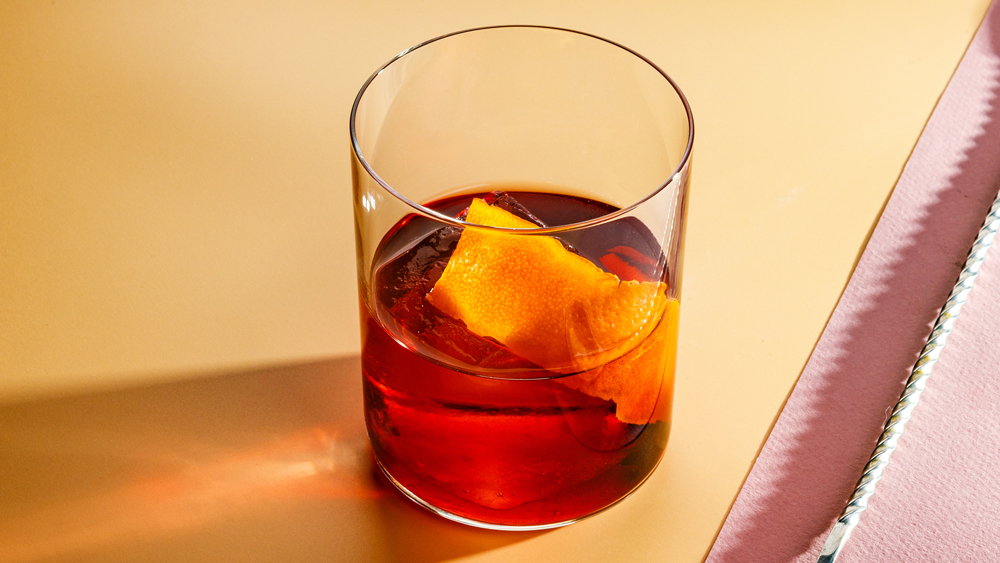You know how you’ve been searching for a bitter tropical Manhattan?
Of course you haven’t. No one has. The Bitter Tears is the cocktail you didn’t know you were missing, because it fulfills a need you probably didn’t know was there. Mixologically speaking, it’s out there, not exactly an orphan the way a Bloody Mary is an orphan, but it’s certainly bizarre. It’s what—a vermouthless Boulevardier? An Algonquin gone wild? It’s got more in common with the Bitter Giuseppe than anything but remains unique, like the third child in a family of dentists who instead went to art school and smokes a pipe.
Working behind a cocktail bar, we’re often asked which of the cocktails on the menu are our personal favorite, which is a question we generally try to avoid. Spend enough time immersed in the esoterica of any one area, and your favorites are bound to drift toward the fringes—I don’t know what Quentin Tarantino’s favorite movies are, but one tends to doubt they involve superheroes. When you live and work in a profession for years, your favorites tend to be a little weird.
So it is with bartenders. I’m proud of (nearly) every drink I’ve put on a cocktail menu over the last dozen years, but the Bitter Tears is perhaps my favorite of all of them. It is made from equal parts Japanese whisky, pineapple-infused white rum and Cynar, with a touch of salt. As such it is simple (just three ingredients), easy to make (same amount of each), easy to reproduce (infusing pineapple is dead simple), and not only unusual (see above), but if I may say, very very good.
The left hand turn here is the pineapple rum. Most everyone these days uses the Plantation Stiggins Fancy Pineapple Rum, which is delicious, but that is the distilled essence of pineapple and so is not precisely the same. Chop up a pineapple and let it sit in rum for three days, and you have an infused pineapple rum, juicy with a non-trivial amount of acidity, and that acidity in a stirred, Manhattan-like cocktail is fascinating and delicious. This brightness is anchored by the deep earthy bitterness of the Cynar, the Japanese Whiskey offers a soft grain finish, and the salt keeps the whole project from becoming too bitter. It’s strong and smooth, bitter and a bit refreshing, with the bracing intensity of a Manhattan made almost tiki-ish with pineapple.
It is, in short, the bitter, tropical Manhattan you’ve been waiting for.
- 1 oz. Cynar
- 1 oz. Suntory Toki
- 1 oz. pineapple-infused white rum
- Small pinch of salt, or 5-7 drops of a 1:4 salt to water tincture
Add all ingredients to a mixing glass with ice and stir for 10 to15 seconds (for small ice) or 15 to 25 seconds (for bigger ice). Strain off the ice into a coupe or cocktail glass, express the oils of a grapefruit peel over the drink, and garnish with the peel.
NOTES ON INGREDIENTS
Photo: courtesy Reserve Bar
Cynar: Cynar is one of the Carciofo, or amari that are flavored with artichokes. It doesn’t taste much to me of artichokes, but rather just of earthy and vegetal bitterness. There are other Carciofi and they might work, but I’m such a fan of the balance in this drink, and Cynar is so accessible and inexpensive, I’d just insist on it.
Suntory Toki: Toki is a blended Japanese whiskey designed for mixing. There’s a persistent grainy quality to it that really shines in Japanese Highballs and here provides the ideal backdrop for the marriage of the rum and Cynar. Other spirits would be good, too, but this was created for Toki’s unique signature, and as it’s both inexpensive and easy to find, I would recommend it.
Pineapple-infused White Rum: Grab a light, 40 percent ABV, Spanish style rum. There’s some flexibility here—I’ve worked with and can vouch for Ron Matusalem or Flor de Caña, but lots of others would work. Cut the skin off a pineapple and remove the flesh from the core, cut the pineapple flesh into fun-sized pieces, and put it into a non-reactive container or pot. Add the rum, stir to integrate, cover, and put somewhere dark for three days. The refrigerator works great; if you don’t have room, the only thing to add is to make sure the rum covers the pineapple—weigh it down with a dinner plate, if necessary—to prevent the tops from molding in the air. After three days, strain out the solids. Keeps indefinitely at room temperature.
